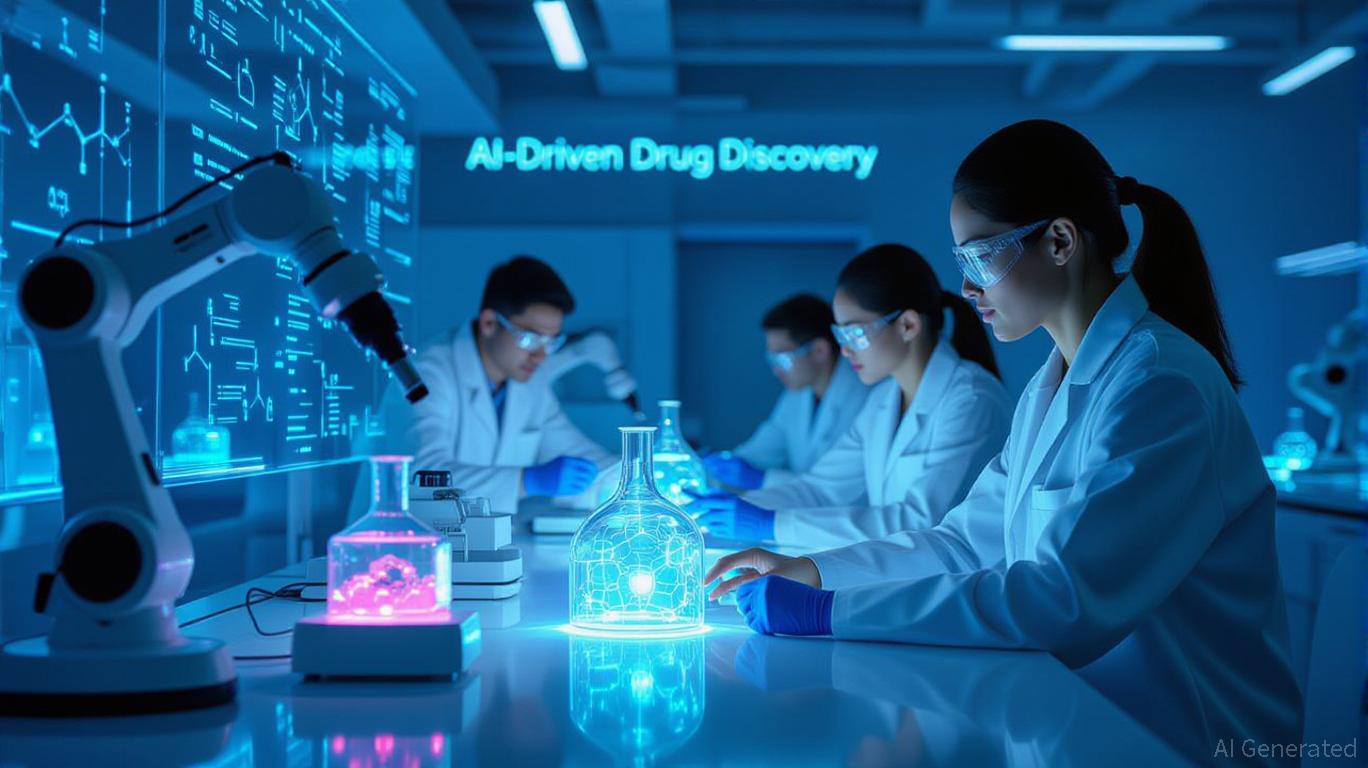Artificial Intelligence Applications in Biomedical Studies and Their Impact on Investment
- AI is revolutionizing drug discovery by accelerating timelines and reducing costs in pharmaceutical R&D. - Companies like Insilico Medicine and Exscientia use AI to cut drug development cycles by 70% and reduce compound testing, advancing candidates to clinical trials rapidly. - The AI-driven biotech market is projected to reach $350–410 billion annually by 2025, offering investment opportunities in AI-native firms and infrastructure providers. - However, regulatory challenges and the lack of approved AI
AI Revolutionizes the Pharmaceutical Sector
The pharmaceutical landscape is experiencing a profound transformation as artificial intelligence (AI) technologies rapidly alter the pace, expense, and likelihood of success in drug development. AI’s influence extends from creating innovative molecules through generative models to streamlining clinical trials with advanced machine learning. This shift is not merely incremental—it marks a fundamental change in the industry. For investors, the focus has shifted from questioning whether AI will impact biotech to determining the best strategies for capitalizing on this evolution.
AI Accelerates Drug Discovery
Historically, bringing a new drug to market has required over a decade and billions in investment, with high rates of failure. AI is now dramatically shortening these timelines and cutting costs by automating processes that once depended on human expertise and trial-and-error experimentation. For example, Insilico Medicine utilized AI to develop a treatment for idiopathic pulmonary fibrosis (IPF), moving from identifying a target to initiating Phase I trials in just 18 months—a journey that typically spans four to five years. Similarly, Exscientia has harnessed AI to reduce digital design cycles by 70% and decrease the number of compounds synthesized by a factor of ten, allowing its candidate DSP-1181 to reach Phase I trials for obsessive-compulsive disorder within a year.

These breakthroughs are part of a broader trend. BenevolentAI has applied AI to uncover new targets for glioblastoma by merging transcriptomic and clinical information, while Recursion Pharmaceuticals identified the drug candidate REC-2282—now in advanced clinical trials for meningiomas—using its AI-driven platform. The unifying factor is AI’s unmatched ability to analyze massive datasets, detect intricate patterns, and simulate biological processes beyond human capability.
Economic Impact and Strategic Considerations
The financial implications are substantial. One pharmaceutical initiative reportedly saved $42 million by leveraging AI to accelerate research, and industry forecasts suggest the sector could generate $350–410 billion in annual value by 2025. For investors, this presents two main avenues:
- Direct investment in AI-focused biotech firms such as Insilico, Exscientia, and BenevolentAI, which are developing comprehensive AI platforms for drug discovery.
- Indirect investment in technology providers—including cloud computing and SaaS companies—that supply the infrastructure powering these advancements.
Nevertheless, challenges remain. Regulatory bodies like the FDA and EMA are still determining how to assess drugs developed with AI, raising concerns about transparency and the interpretability of AI models. Additionally, while AI has accelerated the discovery process, it has yet to produce an approved drug, leading some critics to question whether it will improve success rates or simply hasten unsuccessful outcomes.
The Potential of ICP Caffeine AI and Decentralized Computing
Although ICP Caffeine AI is primarily recognized for its role in decentralized finance, its foundational technologies—such as distributed computing and generative AI—could, in theory, support drug discovery. Distributed networks may make high-performance computing more accessible, empowering smaller biotech firms to conduct complex simulations. However, as of 2025, there is no concrete evidence that ICP Caffeine AI has been directly applied to pharmaceutical research and development. This underscores the importance of distinguishing between the general promise of AI and the proven integration of specific platforms into drug development workflows.
Investment Approaches: Weighing Innovation Against Risk
Investors must carefully separate genuine innovation from market hype. While early-stage AI biotech companies face significant regulatory and technical obstacles, those with validated clinical candidates—such as Exscientia’s EXS-21546 for solid tumors—or partnerships with established pharmaceutical companies are better equipped to overcome these barriers. The proliferation of SaaS and cloud-based AI solutions is also making advanced tools more accessible, allowing even smaller players to participate without substantial upfront investment.
The Asia-Pacific region is emerging as a dynamic growth market, thanks to its expanding biotech sector and efficient adoption of AI technologies. Furthermore, the use of generative AI for designing new molecules and biologics is projected to experience the fastest growth in the coming years.
Summary
While AI is not a universal solution for all challenges in drug discovery, it is fundamentally reshaping the industry by lowering costs, speeding up development, and revealing new therapeutic targets. Investors stand to benefit most by supporting platforms that show real clinical progress and regulatory compliance. Although tools like ICP Caffeine AI have yet to make a direct impact on pharmaceutical research, the broader AI-driven transformation in biotech is unmistakable—and those who act early may gain significant advantages.
Disclaimer: The content of this article solely reflects the author's opinion and does not represent the platform in any capacity. This article is not intended to serve as a reference for making investment decisions.
You may also like
Ethereum Updates Today: BitMine's Pursuit of Ethereum 'Alchemy': 3% Ownership Targeting 5% Milestone
- BitMine acquires 3.63M ETH (3% supply), advancing its "Alchemy of 5%" goal to control 5% of Ethereum's network. - Aggressive buying positions BitMine as second-largest crypto treasury globally, with staking via MAVAN stabilizing its balance sheet. - Upcoming Fusako upgrade (Dec 3) aims to boost staking efficiency, but market remains fragile with $3,000 resistance and $2,850 support critical. - Institutional caution grows as Ethereum ETFs see $500M outflows, while analysts question BitMine's $2,840 averag

INJ at $6.30: Holding Firm in a Downtrend or Poised for a Bullish Breakout

DeFi Faces a Trust Challenge: Balancer Recovers $8 Million Following $128 Million Hack
- Balancer proposes $8M repayment plan after $128M exploit, returning funds to liquidity providers via pro-rata in-kind distribution. - Whitehat actors receive 10% bounties in rescued tokens; non-socialized model ensures pool-specific funds go only to affected LPs. - Exploit exposed systemic risks in DeFi's composable pools, with attackers exploiting rounding errors despite 11 prior audits by four firms. - Governance vote will finalize distribution framework, with claim interface enabling 90-180 day token

AI-driven SaaS Revolution: PetVivo Reduces Expenses by 50-90%, C3.ai Collaborates with Microsoft
- PetVivo.ai cuts veterinary client acquisition costs by 50-90% using AI agents, achieving $42.53 per client vs. $80-$400 industry norms. - C3.ai's Microsoft partnership boosts stock 35% as Azure integration enables enterprise AI scalability through unified data operations. - AI-driven SaaS models like PetVivo's $3/lead platform and C3.ai's 19-27% revenue growth highlight AI's disruptive potential in traditional industries. - Both companies face challenges scaling beta results and converting pilots to long